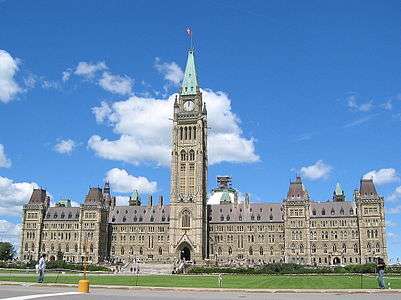Cannabis Act
| Cannabis Act | |
|---|---|
 | |
| Parliament of Canada | |
| An Act respecting cannabis and to amend the Controlled Drugs and Substances Act, the Criminal Code and other Acts | |
| Enacted by | House of Commons |
| Enacted by | Senate |
| Date of Royal Assent | June 21, 2018 |
| Date effective | October 17, 2018 |
| Legislative history | |
| Bill introduced in the House of Commons | C-45 |
| Introduced by | Jody Wilson-Raybould, Minister of Justice |
| First reading | April 13, 2017 |
| Second reading | June 8, 2017 |
| Third reading | November 27, 2017 |
| Committee report | Report 12[1] |
| Bill introduced in the Senate | C-45 |
| First reading | November 28, 2017 |
| Second reading | March 22, 2018 |
| Third reading | June 7, 2018 |
| Status: Not yet in force | |
The Cannabis Act (full title: An Act respecting cannabis and to amend the Controlled Drugs and Substances Act, the Criminal Code and other Acts), also known as Bill C-45, is a law that will, upon coming into effect on October 17, 2018, legalize recreational use of cannabis nationwide in Canada, when combined with Bill C-46, An Act to Amend the Criminal Code.[2] The law will be a milestone in the legal history of cannabis in Canada, alongside the 1923 prohibition.
The Act was passed by the House of Commons of Canada in late November 2017.[3] It was passed in the Senate of Canada on June 7, 2018, and the House accepted some Senate amendments and sent the bill back to the Senate on June 18.[4][5] The Senate then passed the final version of the bill on June 19,[6][7] and it received Royal Assent on June 21. The Act will be effective on October 17,[8] making Canada the second country in the world to legalize recreational cannabis nationwide after Uruguay.
History leading up to act
The Liberal Party of Canada proposed legalization in 2012[9] and it was a major campaign platform for Justin Trudeau who became Prime Minister of Canada in 2015.[10] Shortly after election, the Task Force on Cannabis Legalization and Regulation was convened to study the issue. They released a report on Dec. 13, 2016.[11] On April 10, 2017, the Canadian Broadcasting Corporation and sources in other countries reported that the Liberals intended to table legislation by April 13, in time for it to be considered prior to the 420 "holiday".[12][13][14] A legalization date prior to July 1, 2018 was set to avoid Canada Day.[15] Canadian policymakers considered regulations and laws around legalized cannabis in Colorado, Washington State and Uruguay as a model.[16]
Act and its provisions

_-_Voting_Results_by_MP.svg.png)
_-_Voting_Results_by_MP_(Simple_Map).svg.png)
On April 13, 2017, Bill C-45, with the short title Cannabis Act, was introduced to Parliament, sponsored by Jody Wilson-Raybould, Minister of Justice and Attorney General of Canada. It would allow for national use by individuals 18 and over, and possession of 30 grams. Provinces could further restrict possession, sale and use. Legal sales will take place at retail outlets or through the mail.[17][18] The provinces are responsible for setting up a system for retail sales. Mail delivery will be handled by the federal government.[19] The bill was said on 14 April 2017 to have a solid majority of support from both the governing Liberal Party and the Conservative Party.[20]
Personal production: Individuals will be permitted to grow up to four plants for their own use. While the sale of edibles (baked goods, drinks, etc) will not be allowed initially, individuals can make edibles at home for their own use.[21]
Promotion and packaging: Companies will be allowed to brand their products, but they must avoid anything that would appear to appeal directly to youth such as cartoon characters, animals, or celebrity endorsements. Event sponsorship is also not allowed. Companies can also use factual information on their packaging, such as THC levels, that would help consumers make a decision on what product to buy. Promotion is only allowed in places where youth cannot view it.[19]
Revenue projections
Tax revenue to the national treasury is projected to be upwards of $675 million a year.[22]
Effective date
Prime Minister Justin Trudeau announced that recreational use of cannabis would no longer be against the Criminal Code as of October 17, 2018.[23]
Reactions
National legalization of cannabis north of the Canada–United States border is expected to create a competitive pressure for the United States to legalize at the federal level, lest consumers divert billions of dollars of revenue outside of the country.[20]
Many were disappointed that the legislation did not contain plans to expunge the criminal records of persons charged with simple possession. This means that anyone with a record for possessing under 30 grams will still need to petition a Record Suspension after a five year waiting period.[24] This led some activists to believe that the legalization is not "true legalization" [25] and does not help people who come from disadvantaged backgrounds.[26]
A satirical reaction in The Beaverton, an online Canadian publication, said that legalization would make cannabis "shittier and harder to get" in a country where it is already plentiful.[27] Canoe.com reported that the bill was rushed and failed to address concerns of the black market and did not set limits for legal impairment for motor vehicle operators.[28]
During the Lac St. Jean byelection, the debate over legalization was an issue. The Bloc Québécois candidate Marc Maltais expressed concerns over the bill's ability to respect provincial jurisdiction. The NDP candidate felt that the July 1st deadline was too fast for legalization to be implemented.[29]
A lawyer pointed out that the ticketing provision in the Act could likely "violate the Canadian Charter of Rights and Freedoms."[26]
References
- ↑ "HESA - Bill C-45, Cannabis Act". www.ourcommons.ca. Retrieved 20 June 2018.
- ↑ "gnb.ca: "Report of the New Brunswick Working Group on the Legalization of Cannabis"" (PDF). gnb.ca. Retrieved 20 June 2018.
- ↑ "Federal marijuana legislation approved by House of Commons, moves on to Senate". Retrieved 20 June 2018 – via The Globe and Mail.
- ↑ Senate votes to pass recreational legalization of pot, bill now goes back to House of Commons, CBC News, June 7, 2018
- ↑ Anapol, Avery (2018-06-18). "Canada's House of Commons votes to legalize marijuana". TheHill. Retrieved 2018-06-19.
- ↑ "Senate passes cannabis legalization bill in final vote". CTVNews. June 19, 2018. Retrieved June 19, 2018.
- ↑ "Marijuana legalization Bill C-45 officially passes Senate vote, heading for royal assent". Global News. Retrieved June 19, 2018.
- ↑ "Cannabis bill receives Royal Assent". CTVNews. June 21, 2018. Retrieved June 21, 2018.
- ↑ "Liberal delegates vote yes to legalizing marijuana, no to cutting off monarchy".
- ↑
Jacob Sullum (October 30, 2015), "Canada is on the brink of making marijuana legal", Newsweek,
Liberal Party leader Justin Trudeau, Canada's new prime minister, ran on a promise to legalize marijuana.
- ↑ A Framework for the Legalization and Regulation of Cannabis in Canada (Report). Government of Canada. November 30, 2016.
- ↑ Catherine Cullen (April 10, 2017), It could be legal to carry up to 30 grams of marijuana under bill to be tabled Thursday: Highly anticipated pot plans will be made public on Thursday, CBC
- ↑ Joel Connelly (April 11, 2017), "Marijuana legalization gets off the pot in Canada: Legislation to come Thursday", Seattle Post-Intelligencer – via San Francisco Chronicle
- ↑ Janice Williams (April 10, 2017), "Canada is introducing marijuana legislation on Thursday which could lead to legalization by July 2018", Newsweek
- ↑ David Cochrane (April 8, 2017), Liberals want to move up pot legalization to avoid Canada Day celebrations: Legalization target of July 1, 2018 will be changed to 'on or before July 1, 2018', CBC News
- ↑ Jillian Kestler-D'Amours (April 12, 2017), Canada set to legalize recreational marijuana, Germany: Deutsche Welle
- ↑ Kathleen Harris (April 13, 2017), Liberals table bills to legalize pot, clamp down on impaired driving, CBC News
- ↑ Ian Austen (April 13, 2017), "Trudeau Unveils Bill Legalizing Recreational Marijuana in Canada", The New York Times
- 1 2 "Introduction of the Cannabis Act: Questions and Answers". Government of Canada. Retrieved October 2, 2017.
- 1 2 Christopher Ingraham (April 14, 2017), "Digging into the details of Canada's new law legalizing marijuana nationwide", The Washington Post – via Denver Post's The Cannabist
- ↑ The Cannabis Act - Marijuana Legalization and Regulation in Canada, MarijuanaLaws.ca
- ↑ Tamara Khandaker (April 11, 2017), A new report suggests Canada will rake in at least $675-million a year from taxing legal weed, Vice News
- ↑ Trudeau says pot will be legal as of Oct. 17, 2018, CBC News, June 20, 2018
- ↑ Scotti, Monique (27 March 2017). "As pot legalization looms, will police keep making arrests?". Corus Entertainment Inc. Global News. Retrieved 27 April 2018.
- ↑ "Famous Canadians share their optimistic predictions for 2018 - Macleans.ca". Macleans.ca. 2017-11-30. Retrieved 2017-12-31.
- 1 2 "Lawyer warns cannabis bill is constitutionally flawed and harmful - The Lawyer's Daily". www.thelawyersdaily.ca. Retrieved 2017-12-31.
- ↑ Tristan Bradley (March 2017), Liberals plan legislation to make marijuana shittier, harder to get, The Beaverton
- ↑
"Rushed pot law could have organized crime lighting up", Canoe.com, April 12, 2017,
In their madness to table reefer legislation, the Trudeau Liberals had to jump the gun on 4/20.
- ↑ ICI.Radio-Canada.ca, Zone Société -. "Cannabis : qu'en pensent les candidats dans Lac-Saint-Jean?". Radio-Canada.ca (in French). Retrieved 2017-12-31.
External links
- Text of bill
- Bill C-45 information at Parliament of Canada
- Fully legal Cannabis comes to Canada Q&A on YouTube (Canadian Broadcasting Corporation, June 20, 2018)